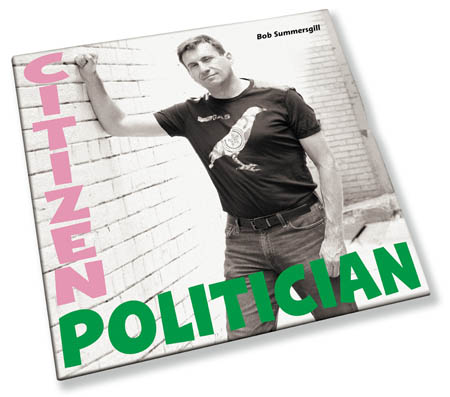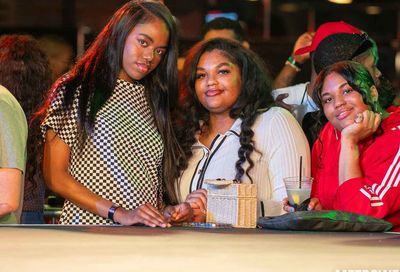Citizen Legislator
Behind the scenes, Bob Summersgill's ''hobby'' is impacting GLBT lives

Bob Summersgill
From childhood, when his father took him to Cape Canaveral to watch the last manned moon launch in 1972, to college when he served as president of the D.C. chapter of Students for the Exploration and the Development of Space, Bob Summersgill had an eye on the cosmos. His short-term cynicism, however, brought him back to earth.
“There just wasn’t a future in it,” says the 44-year-old. “I’m optimistic for the long term, I’m very cynical and pessimistic for the short term…. I wasn’t going to get to space by getting involved with this stuff. I want to be in a movement that’s moving. I want to do things that actually result in some tangible change.”
Summersgill did just that, turning his sights on moving legislation through the D.C. City Council, incrementally empowering the city’s domestic-partnership laws. As a hobby, he’s worked largely behind the scenes for years, crafting legislation, testifying and working with Council members to get GLBT Washingtonians to where they are today, with possibly the strongest partnership law in the country. He’s also served as president of the local Gay and Lesbian Activists Alliance (2000-2003), was named a Capital Pride Hero (2008), and has advocated for the transgender and intersex communities with the D.C. Office for Human Rights. That’s, of course, when we wasn’t fighting for a smoke-free D.C. or planting trees as a “citizen forester” with the nonprofit Casey Trees.
“Bob has been a critical resource behind the expansion of domestic-partnership rights in the District,” says Phil Mendelson, the councilmember with whom Summersgill has been working most closely as of late, and who sponsored the legislation to recognize same-sex marriages from other jurisdictions. “Bob has been invaluable on a range of GLBT issues. Not just domestic partnerships and marriage equality, but, for instance, also on best practices to reduce the incidence of HIV/AIDS.”
While Summersgill’s day job in database administration at the National Academy of Sciences got him into NASA’s credit union, that’s about the extent of his connection to space these days. His Earth-bound passion, however, is thriving in a activist orbit.
 METRO WEEKLY: What do you consider to be the starting point of your GLBT activism?
METRO WEEKLY: What do you consider to be the starting point of your GLBT activism?
BOB SUMMERSGILL: There was an incident at George Washington University where one of the little student papers, one put out by the college Republicans, had a kind of stupid article where the author said that all gays are idiots and should be killed. We decided we should get together as recent alums and called a meeting. How should we respond to this? We decided the best thing to do would be to form a gay alumni group and work for the inclusion of sexual orientation into the university’s non-discrimination policy. That took us about a year and a half, but we succeeded with a lot of help from a law professor by the name of Mary Cheh, who has since gone on to become a City Council member.
MW: The atmosphere at GW was already fairly progressive, though, wasn’t it?
SUMMERSGILL: Yes, but the [gay] student group was being harassed by either the Young Americans for Freedom, a right-wing group, or the Christian Fellowship, an evangelical, fundamentalist group. One or the other would try, pretty much every year, to get the Lesbian and Gay People’s Alliance’s funding cut.
The two attacks that we would have were that we were doing something illegal, sodomy, and that there’s not [anti-discrimination] protection for us anyway.
We got the nondiscrimination policy passed. And then, by chance, I got involved with GLAA and they were working on sodomy-law repeal. With those two things gone, there were no more legal arguments.
MW: From where did you come to Washington?
SUMMERSGILL: North Central New Jersey, a thousand acres of woods across the street — now a thousand starter castles, each on an acre. Warren Township. Dad commuted into New York every day. It wasn’t quite the suburbs. We didn’t have sidewalks. It was four miles to the nearest store. But we were on city sewer and gas, so it wasn’t quite rural.
MW: What about coming out? When did that happen, and under what circumstances?
SUMMERSGILL: Coming out is a process isn’t it? I came out to a friend from high school the summer after high school. I came out to people at GW a few months after I started there.
MW: And you joined the gay student group at GW?
SUMMERSGILL: I think I got involved the summer after freshman year, which is also about the same time I got my first boyfriend. He was sort of closeted too, so we had our circle of gay friends, and the rest of the people we didn’t tell we were gay. It was that kind of crap. It was bad. I really started coming out to everyone when we broke up. I waited until just after I graduated to tell my parents.
MW: How did that go?
SUMMERSGILL: I told them separately, on the same day, after reading PFLAG’s recommendations on how to come out to your parents — it wasn’t on a holiday or in a moving vehicle, that sort of thing.
I told my mom and she said, “Oh my God, Oh my God. Don’t tell your father. What about your sister?”
That’s particularly funny that she would only ask about one sister, as though I would know which one. But, yes, she’s a lesbian. She didn’t have a boyfriend. She played on the rugby team, didn’t have any makeup or dresses. It was kind of obvious.
Dad I told later that day. He said, “What about your sister?” [Laughs.]
Within a few months, they were just great about everything. They marched with my sister and I in the 1993 March on Washington. They had trouble understanding why there weren’t more parents around.
Their religious backgrounds are kind of muted. They’re Eisenhower Republicans, but they haven’t voted for a Republican for president since Ford. They like balanced budgets and local government.
MW: You, too, are obviously a fan of local government.
SUMMERSGILL: I am a fan of being able to make change, and I can have the most effect on the local level.
MW: I don’t really know what you’ve done as far as legislation in this city goes. What comes out of your head and is now affecting my life? I have a domestic partnership. Should I send you flowers?
SUMMERSGILL: You should thank the people back in ‘88 who said we should have partner recognition, Chris Riddiough and Judith Nedrow. That led to the creation of a study group started by Mayor [Marion] Barry on what we should do in recognition of partners. It was headed by GLAA President Lori Jean, who has since gone on to all sorts of wonderful things, like head of the NGLTF and the L.A. [Gay & Lesbian] Center.
That led to the Health Care Benefits Expansion Act of 1992, which is the domestic-partnership law. It had just about no rights and responsibilities in it. There was hospital visitation and D.C. government employees could pay 100 percent for the insurance for their partners. I had nothing to do with that. Should you send me flowers for that? No.
There was a nine-year period that Congress wouldn’t let us spend our own funds to implement it. A little before that ended, I was president of GLAA and I started a little program to figure out what all the rights and responsibilities of marriage are, with the idea that eventually we would get marriage and in the meantime, while we still had the Republican Congress and president, we should add as many of those rights and responsibilities to domestic partners as we can. And since there’s going to be a little trouble to get these things added while the Republicans are in control, we’ll do it in small pieces so they won’t notice. Or they won’t take offense at this one little piece or that one little piece, and over time it will add up to everything. And, as of last week, we’re up to everything because of the parentage bill.
MW: Under different circumstances, can you imagine using a more forceful approach?
SUMMERSGILL: If I thought we could’ve done marriage then, I would’ve said, “Let’s do marriage.” We could have gotten marriage through the Council then. It would have been a tough fight, but we could have gotten it through the Council. But I don’t think there was any chance we’d get that through Congress. With “domestic partners,” we’re avoiding the word “marriage” so we could fill in a lot of things for a lot of people — a lot of important things — if they’re in the circumstances where they need them, and we’re that much closer.
As we get closer to marriage, there is the question of what can we do to make sure that once we get to marriage we can hang onto it. What are the things, for instance, in our law that didn’t support marriage as a human right? The D.C. Code throughout said “husband and wife.” The Council is assuming that marriage is between a man and a woman, a husband and a wife. So for all of those domestic-partnership bills, wherever “husband and wife” appeared, we changed it to “spouse” and “domestic partner.” This is, one, thinking that one day we will have marriage between same-sex couples, so you want to get rid of that anyway. But, also, if there’s a challenge, we can say, “But look, the Council’s intention, through all these different bills, has been to move toward same-sex unions and not assume all marriages are between a husband and wife.”
MW: So you’re just following a formula, plugging in words?
SUMMERSGILL: You want to read it and see if it makes sense. But there is “plain language of the law,” as they say.
You just get used to the format of what a bill is, the language they use in bills. You read a lot of bills. It’s sort of, “Ah, it always starts with this. It always ends with this. There are these rules. Here’s how you change a section. Here’s how you refer to a section.”
It’s formulaic, but it’s not difficult. And it’s not like what I do is always going to be the final product. A bunch of lawyers are going to look at it from the time I suggest it to a Council member before it becomes law.
MW: You make it sound pretty easy.
SUMMERSGILL: It is easy. There’s nothing that I do in the political world that takes a great intellect. It takes perseverance. It takes willingness to accept compromise. It’s about finding a problem with a solution that the politician can actually do. You can ask for the moon, but if they can’t actually deliver, you’re just wasting your breath and their time.
I’m not going to say I’m not smart, because I think I am, but I don’t think I’ve used the limits of my intellect to get legislation passed. It’s not rocket science. I’ve studied some rocket science, and it’s tough; this isn’t it. [Laughs.]
Ninety percent of activism is showing up and staying with it. You’re not going to get everything today. If you keep going, you will get everything. But you have to have a long-term plan. You have to look for all the little pieces that you can fix on the way to the big piece.
MW: What’s the first piece of legislation you wrote, successful or otherwise?
SUMMERSGILL: I don’t remember. It would’ve been something on domestic partners, one of the smaller bills.
I was probably representing GLAA at the time. GLAA is an interesting group. It’s more of a support group for activists than an organized body. They’re a good sounding board for all sorts of ideas, but really, the whole “families project” was my thing. Rick Rosendall, Craig Howell, Barrett Brick, Frank Kameny were all incredibly helpful and supportive in saying, “You probably want to do something a little different here, a little different there,” but it was always my project. I’d say, “I’m thinking about doing this,” and they’d say, “That’s great, [but] you need to fix this or that.”
And they were working on their own projects. That’s what you get with an all-volunteer group with a lot of headstrong people. Everyone comes in and says, “I want to work on this.” Go for it. Craig Howell is the expert in the District on the Human Rights Act. No one knows more about it, how it came to be, and how it works, the structure and the process. He’s the reason we have such a strong human-rights law in this city.
MW: Did you know Councilmember Barry very well when he was mayor?
SUMMERSGILL: I can’t say I knew him. I was working with people who do. I’ve never had a relationship with Barry.
When he first ran for the School Board, GAA rated him. At that point, it was a plus-15 to minus-15 scale. He got a minus-15. The very next election, he reversed that. It was changed to a plus-10, minus-10 scale; and he got a plus-10.
He did a very fast reversal. As mayor, I won’t say he went out of his way, but he was good to us. In his second term, he had appointed more gay and lesbian people to boards and commissions in D.C. than every other mayor in the country put together. That’s not minor.
MW: And his current reversal with the gay community, the sole member of the Council to stand against marriage recognition?
SUMMERSGILL: His personal life destroyed his political reputation, his ability to get anything done. He was a marginal councilmember at best before this. He didn’t introduce or sponsor any major legislation of any note. He did some jobs things and this and that, but nothing major. Then his tax situation broke and it turned out he hadn’t paid taxes. He managed to work that out so they’re only garnishing his wages and leaving him on probation. I think it’s too bad that he wasn’t removed from office because of that. That’s not what any legislature should have as part of their membership. There’s no excuse for that.
MW: Regardless of the taxes, do you think the gay community today owes Marion Barry a debt?
SUMMERSGILL: We’ve paid our debt. At this point, Barry is holding us back.
MW: In the Capital Pride Parade in June, you marched with the Mendelson contingent. With which other councilmembers or mayors have you worked closely?
SUMMERSGILL: I’ve had the best working relationship — other than Phil — with Jack Evans. I have friendly, but not tight, relations with David Catania, Jim Graham, Mary Cheh and Tommy Wells. We greet each other warmly. For past councilmembers, Carol Schwartz and Kathy Patterson were really outstanding and really wonderful for us as a community.
MW: Any you’d consider personal friends?
SUMMERSGILL: None that I would call up and say, “Hey, let’s go see a movie.” I’ve had meals with a few of them, but always as a “councilmember and citizen lobbyist” kind of thing. Friendly, but not buddies.
MW: When did you become independent of GLAA?
SUMMERSGILL: About two years ago. I’m a member, I’m just not representing them when I go out and do things. I have the greatest respect for them and what they do. I just want to do things in my own way.
There is no group that does what GLAA does. No one else is actively publishing an agenda and seeking to carry out every point on their agenda. Not everything is being carried out with the same degree of intensity, but nobody does what they do. [The Gertrude] Stein [Democratic Club] is really good at building relationships with councilmembers, pushing in kind of indirect ways, not so much legislation, on moving the Council into gayer and gay-friendlier area. And frankly, we have an extraordinarily gay-friendly Council. San Francisco and West [Hollywood] may have better, but we’re the envy of the country.
Most people have no idea what we’re doing. No clue. Even when we’re done, there’s no news coverage in any of the press.
MW: “We” meaning GLAA?
SUMMERSGILL: GLAA, me. Most gay-rights bills don’t get any kind of notice whatsoever. That’s mostly good. GLAA does not seek publicity. They don’t run away from it. I think they’d like to get more, but they’re not seeking it. They don’t even seek members. They haven’t done a prospecting-membership letter in something like 15 years. I didn’t do it when I was president.
We were just too busy with all the legislation, all the policy stuff, with oversight hearings, with everything else. No one wants to run the group to be a group. And they don’t need to. They’re criticized for being small. They could spend their time being big — and less effective.
MW: Of your activism, what makes you proudest?
SUMMERSGILL: The proudest thing is getting rid of the sodomy law, although I had a minor role in that. Next is the marriage recognition, and the, really, about eight years of work that went into that.
People don’t seem to realize that it took that long to get everything in place. If we had started now and hadn’t done any of the earlier stuff, we probably could have done what we did, but we wouldn’t be guaranteed a success. With the eight years of work that led up to it that got all the little obstacles out of the way — that you’ve never even heard of and don’t even need to hear about — we were pretty much guaranteed success. We took out all the things they could use against us when they went to court. It was all gone.
If you read through Brian Flowers’ testimony — he’s the general counsel to the D.C. Council — to the [D.C] Board of Elections [and Ethics] on why the measure was not a proper subject for referendum, he lists a whole bunch of changes to the [D.C.] Code. And I, or I representing GLAA, did all of them. These things that they’re basing these decisions on took a lot of time to put into place. But once they were in place, this was pretty much guaranteed. But Congress isn’t guaranteed.
MW: When it comes to GLBT equality and you hear people argue “If not now, when?” do you resent it, or is that an important part of the debate?
SUMMERSGILL: I resent it. But then I think it’s not worth responding to because they’re not going to do anything anyway. It’s going to come down to what I do and what a few other people do. You’re wrong, but I’m not going to spend too much time arguing with you, because you’re just chatting away. So chat, and I’ll get on to actually getting something done.
MW: How much time to you put into this?
SUMMERSGILL: A few hours a week. It’s a hobby. I rewrite laws for fun. It doesn’t take long, but it requires persistence. I can get things done because the councilmembers by and large know me. They know I’m not looking for a special handout. They know I’m not trying to get a job or funding for my project. I’m trying to help a community.
They know I’ll come through for them at election time in speaking out in favor of what they’ve done for our community. They know our community is well-enough organized and that the town is liberal enough that coming out on gay issues doesn’t hurt them. I take “no” for an answer when they think it’s pushing too far. Sometimes they go further than I was ready to go, which is nice. So the domestic-partnership bills went a little further than I thought we should go at the time, but I didn’t try to stop it, either. I work with their staff. It’s building up these relationships over years. Frank Kameny’s been doing this since the ‘50s. Craig Howell, again, the backbone of GLAA — not that he’s been given any credit for doing any of it — has been doing this since the early ‘70s. He’s kept the group consistent and on track for that long.
Working on legislation for all those years, and building up those relationships, when you say GLAA they go, “Oh, what do you need?” Or now I can just use my own name. It’s also showing up at hearings. It’s testifying. Most of the domestic-partnership bills the last eight years, I was the only public witness. Sometimes there’d be someone from the government, but just as often not. Usually I’m the only one there. No one knows, no one cared, but I’m the one who’s there because I’m the one who’s pushing for it, I’m the one who’s asking for it, saying maybe we should do this or do that. And they say okay because it doesn’t cost them anything. Most of the domestic-partnership bills had no expense associated with them.
MW: Do you get tired of this?
SUMMERSGILL: Part of why I don’t burn out is that this isn’t my job. I do what I do when I want because I want to. I don’t have to meet anyone else’s deadline. I don’t have a boss that’s coming down on me for what I have or have not done on this. This is a hobby — I don’t want to have it be my job. I don’t want to go in every morning at 9 or earlier and deal with people like me. [Laughs.] How horrible would that be?
Support Metro Weekly’s Journalism
These are challenging times for news organizations. And yet it’s crucial we stay active and provide vital resources and information to both our local readers and the world. So won’t you please take a moment and consider supporting Metro Weekly with a membership? For as little as $5 a month, you can help ensure Metro Weekly magazine and MetroWeekly.com remain free, viable resources as we provide the best, most diverse, culturally-resonant LGBTQ coverage in both the D.C. region and around the world. Memberships come with exclusive perks and discounts, your own personal digital delivery of each week’s magazine (and an archive), access to our Member's Lounge when it launches this fall, and exclusive members-only items like Metro Weekly Membership Mugs and Tote Bags! Check out all our membership levels here and please join us today!
























